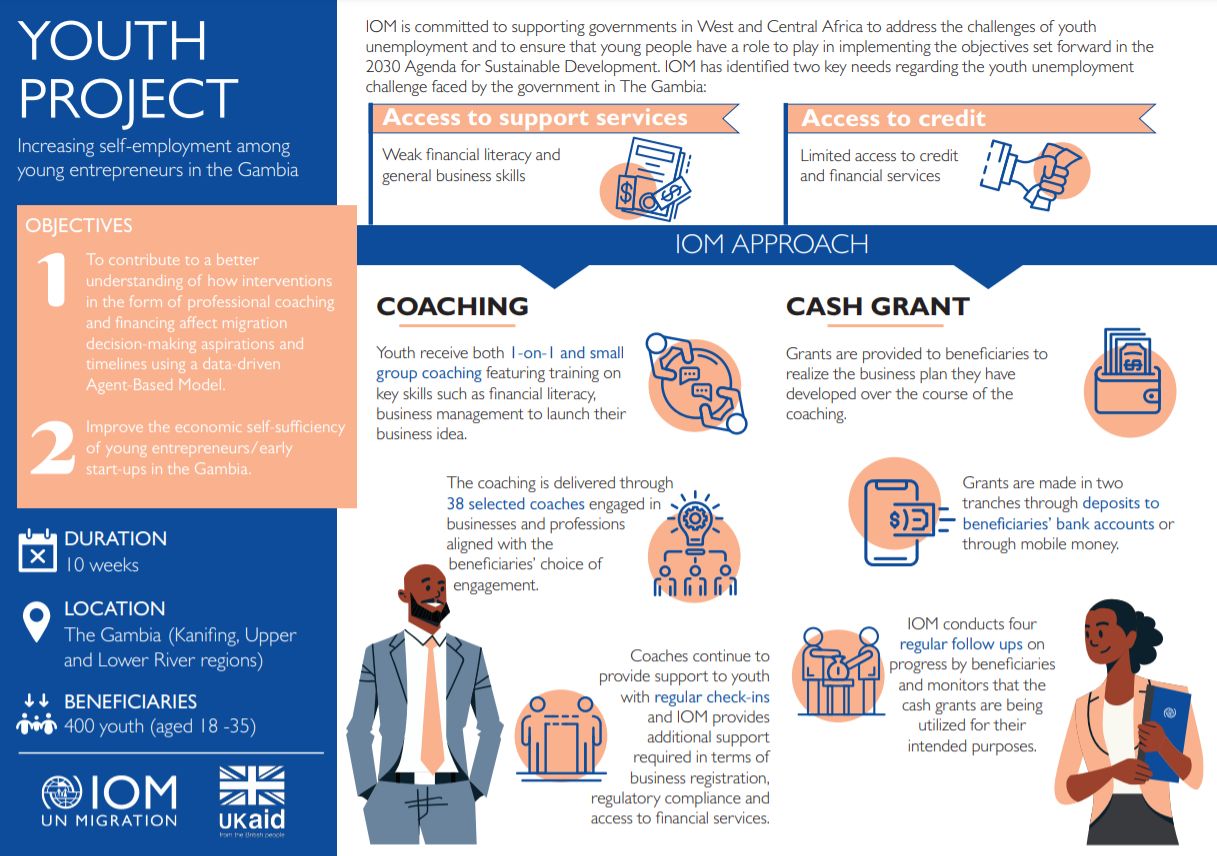-
Who we are
WHO WE AREThe International Organization for Migration (IOM) is part of the United Nations System as the leading inter-governmental organization promoting humane and orderly migration for the benefit of all. IOM has had a presence in the United Kingdom since 1995.
About
About
IOM Global
IOM Global
-
Our Work
Our WorkAs the leading inter-governmental organization promoting humane and orderly migration, IOM plays a key role to support the achievement of the 2030 Agenda through different areas of intervention that connect both humanitarian assistance and sustainable development. In the UK, IOM supports migrants through a variety of resettlement, support and protection activities.
Cross-cutting (Global)
Cross-cutting (Global)
- Data and Resources
- Take Action
- 2030 Agenda
Why do people migrate, how do they make the decision to move, and what factors affect their choices? Together with University of Birmingham, IOM produced a research study, MigChoice, that investigated these questions. The component looked at development interventions in The Gambia, Guinea and Senegal to better understand the research question How and to what extent do development interventions affect people’s migration aspirations, decision and movement, and on what timetable?.
The relationship between development and migration has also long been a focus of practitioners, policy makers and academics alike. Most perspectives agree that how development and migration intersect is highly contextual. Migration and development processes vary greatly and are deeply connected to wider processes of social and economic change.
IOM worked with University of Birmingham to understand the context-specific nature of migration and development, and how they intersect together. It acknowledged migration can be complex and non-linear. Using a multi-method approach, it explored a range of past, current and potential future policy interventions that are relevant to migration. The study sheds light on the range of past, current and potential future migration options that individuals may choose (or reject) when they make migration decisions, focusing on the reasons why they make those choices, and the extent to which development interventions influence those choices.
Supporting Young entrepreneurs in The Gambia
Youth unemployment is an acute issue in Sub-Saharan Africa felt by many African nations. In The Gambia, the Government of The Gambia has made tackling youth unemployment a priority. National development policies envision improving and expanding employment opportunities for the youth through focusing on entrepreneurship. IOM implemented an 12 week integrated programme where 400 youth (18-35 according to national definitions of “youth”) with entrepreneurial aspirations were offered professional coaching and an unconditional grant to overcome some of the challenges associated with launching a business.
- Infographic
-
 .
.
Agent Based Modelling
Agent-based modelling is a relatively novel analytical method; it is a form of computer simulation where the programmer creates an artificial society of agents who are adaptive to their environment. The ABM allows a “natural” depiction of a system, which is very difficult to achieve using other analytical methods. This approach is especially well suited to study how migration systems work and the impact of perturbations to that system (through an intervention, say) given the non-linear and complex nature of migration system.
Life Stories and Community Dynamics
Ethnographic research studies people, their cultures, customs, habits and mutual differences. By capturing people’s individual and family stories, as well as community stories, a broader picture of migration dynamics can be painted. The ethnographic research focused on a broad range of interventions which included understanding education dynamics, mining, agriculture, professional training and the experiences of returned migrants. In Guinea for example the following thematic interventions: education, environment, agriculture, mining and return migration will be the focus of the ethnographic fieldwork. Similarly, Senegal will be exploring the process of migration decision making and its connections with development interventions (agriculture; education; professional training; return and integration). Ethnographic research produces better and richer perspectives than an exclusive focus on semi-structured interviews and survey-based research that are already underway in other research projects.
- Guinea Ethnographic research study
- Senegal Ethnographic research study
- The Gambia Ethnographic research study
Diaspora Communities in the UK
The study sought to understand the views of those who have migrated and built lives from themselves away from their countries of birth. IOM engaged Gambian, Guinean and Senegalese diaspora communities in the UK, to better understand and share learnings about the triggers behind the migration decision making process from these countries and share learnings.
Mapping of Diaspora Communities in the UK & Community Engagement
Mappings were conducted across the UK, taking in perspectives of Guinean, Gambian and Senegalese diaspora. Thought to be the first mappings of their kind, the study interviewed over 300 diaspora to gather demographic data, and to understand the role they still have in migration decision making with family and friends.
Outreach sessions and engagement workshops were held with over 150 diaspora participants from the Guinea, Gambia and Senegal communities in the UK. The sessions and workshops sought to discuss migration decision making, and capture and understand the views of those who have migrated and built lives from themselves away from their countries of birth including their ongoing interactions with migration decision making in Guinea, Gambia, and Senegal.
Capturing the Experiences of Diaspora Members in the UK
Some perspectives of diaspora in the UK are captured in these videos, as oral histories. The diaspora members speaks candidly about their migration experiences, how they feel about their lives now in the UK, and their feelings about the migration process.
- Diaspora Voices Videos